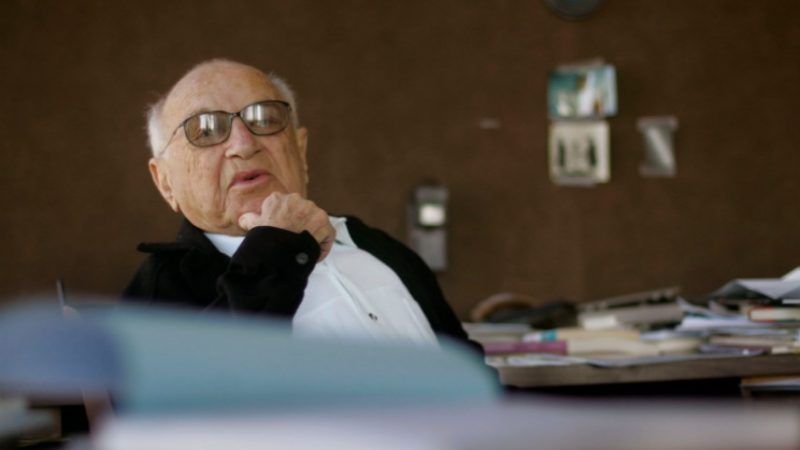The Hottest Midterm Race Is Milton Friedman Versus Marc Benioff
A billionaire progressive CEO and a dead free-market economist walk into a bar.

Of all the high-profile political contests on the ballot this week—Ted Cruz versus Beto O'Rourke in Texas, Stacey Abrams versus Brian Kemp in Georgia, Dean Heller versus Jacky Rosen in Nevada—the one that may be the most consequential, long-term, is Marc Benioff versus Milton Friedman.
Benioff is the new owner of Time magazine and is the founder and chairman of Salesforce, a software company based in San Francisco. Bloomberg estimates his wealth at about $6 billion.
Friedman is the Nobel Prize winning economist who spent a career teaching at the University of Chicago and then joined the Hoover Institution at Stanford. He died in 2006 in San Francisco.
Neither Benioff's name nor Friedman's is on the ballot. What is on the ballot, though, at least in the City of San Francisco, is Proposition C, which would raise business taxes there by an estimated $250 million to $300 million a year for the purpose of providing housing and services to homeless people.
Benioff has emerged as the proposition's most prominent public advocate, and he's also achieved the rather remarkable feat of maneuvering Friedman, posthumously, into the position of a kind of cartoonish lead spokesman for laissez-faire capitalism.
The advantage of this tactic for Benioff is that Friedman, having been dead for a dozen years, isn't around to defend himself or to challenge Benioff to a debate. Friedman's argument, though, is so much stronger than Benioff's that by the time this one is over, the Salesforce billionaire may be wishing he left Friedman out of it.
Benioff has been escalating his feud with Friedman's memory for years. In a 2014 commencement address at the University of Southern California, Benioff enthusiastically quoted General Colin Powell, "I've brought you here today to tell you something very important, that Milton Friedman was wrong, that the business of business is not business." Never mind that that's not even a Milton Friedman quote but a mangling of one from President Calvin Coolidge, or maybe a Harvard Business School professor, Theodore Levitt.
In a February 2015 article for the Huffington Post, Benioff wrote, "The renowned economist Milton Friedman preached that the business of business is to engage in activities designed to increase profits. He was wrong. The business of business isn't just about creating profits for shareholders—it's also about improving the state of the world and driving stakeholder value."
And in a recent New York Times op-ed arguing for the San Francisco tax increase, Benioff again started up with Friedman: "'There is one and only one social responsibility of business,' the economist Milton Friedman famously wrote in 'Capitalism and Freedom': 'to increase its profits.'"
Benioff went on to quote a New York Times magazine article Friedman wrote in 1970. Benioff called the article's argument "myopic." That struck me as a cheap shot at Friedman, who was well known for his large, thick eyeglasses.
The San Francisco tax situation is a perfect example of why Friedman has, by far, the clearer view of this one. Benioff argues for the tax on two main grounds. The first is self-interest of the businesses. "The real threat to business comes from the homeless crisis itself," he writes. "If employees can't walk safely to work, companies might think twice about locating in the city."
That line of argument, though, isn't in conflict with Milton Friedman. If a business is genuinely threatened by a social issue, management is justified in spending money to try to fix the issue, as Friedman put it, right up to "the amount that is in the best interests of the corporation." Management could decide to move offices elsewhere. It could hire security guards. It could decide to pay workers more to compensate for the risk or hassle of a large street homeless population. It could decide to spend money on housing the homeless or on providing them services. The best solution might also take into account the company's reputation, which also helps attract customers, shareholders, and employees. All this is perfectly consistent with pursuing long-term profits.
A second line of argument by Benioff appeals not to self-interest, but to altruism. He frames the appeal in terms of generosity. "It's time for the wealthiest businesses and business owners to step up and give back to the most vulnerable among us," he writes.
There, at least when he refers to "businesses" rather than "business owners," Benioff runs afoul of Friedman, and of logic. Because when money from a business is taxed—even at the behest of a CEO such as Benioff—it's not a voluntary "give," but a mandatory "take." And, crucially, the money being taken away isn't just Benioff's. As Friedman pointed out, such funds might have been used to provide higher returns to shareholders, higher wages to employees, or lower prices to customers. Each of those constituencies might, in turn, have causes that they put higher priority on than reducing street homelessness in the city of San Francisco.
It's a sad day when our leading CEOs, commencement speakers, and newsmagazine proprietors—or, in the case of Benioff, all three things in one—don't comprehend the 50-year-old insights of a Nobel-laureate economist. Or maybe it's a happy day that the ideas of that economist are so influential and durable that, even a dozen years after his death, the Benioffs of the world are still trying unsuccessfully to rebut them. It'll be interesting to see where the voters of San Francisco come out on the question this week. My money's on Milton Friedman.


Show Comments (33)